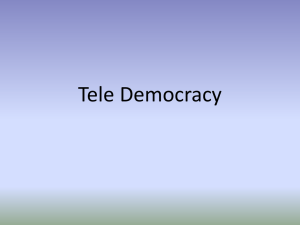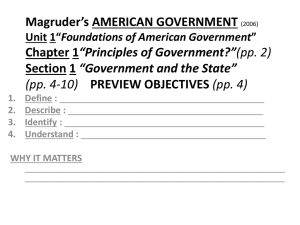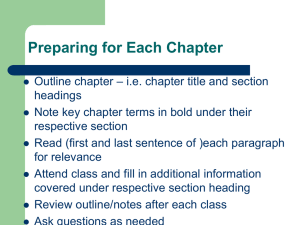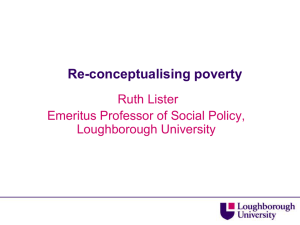TOLERANTIE ALS X EN Y
advertisement
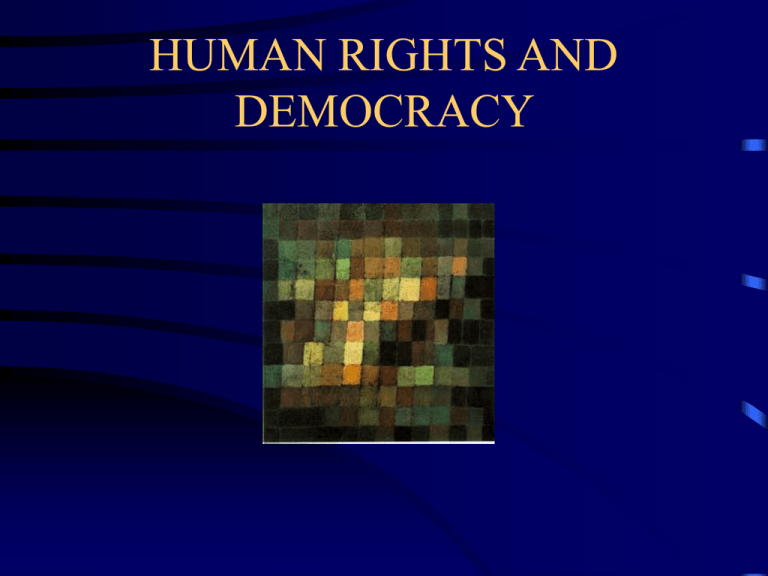
HUMAN RIGHTS AND DEMOCRACY 1. HUMAN DIGNITY How to conceive human rights? 2. INDIVIDUAL FREEDOM AND POLITICAL SOVEREIGNTY To what extent is there a tension between human rights and democracy? 3. THE PERFORMATIVITY OF THE HUMAN RIGHTS DISCOURSE What are the preconditions for political change? 1. HUMAN DIGNITY TWO CORE VALUES Human rights and democracy are two core values. The dream of 1989 > to establish quickly a new world order based upon both values. The end of the dream > the genocides in Bosnia and Rwanda. Political abuse of both values > the justification for the use of massive military force (Iraq). Still it makes sense to discuss the relations between human rights and democracy. POLITICAL AUTONOMY Democracy > rule by the people (Gr. demos > people; kratos > to rule). Two pillars of democracy: 1. Elections > the process of decision-making, i.e. the formation of the will of the people. 2. Public sphere > the process of public communication, i.e. the discursive formation of the opinion. Aspects of democracy: Voting should be in accordance with the general idea of oneperson-one-vote. Majority rule. Citizens create the laws to which they submit themselves. Democracy implies political autonomy > political power is authorized and controlled by the people over whom it is exercised, and this in such a way as to give these persons roughly equal political influence. UNIVERSALLY VALID CLAIMS Human rights > claims of individuals asserted to states, confederations, transnational institutions and companies who are based on human dignity. All human beings are entitled to make these claims. These claims are universally valid, i.e. independent of cultural differences and historical developments. Human rights are claims of individuals and not claims of groups. In order to secure human rights a specific global order is required. ASPECTS OF HUMAN RIGHTS The debates about human rights are often related to the tension between facts and values, is and ought, description and prescription. In order to understand this tension, it is fruitful to analyse the relations between law, politics and morality. Human rights can be seen as moral norms and judicial norms. Politics > the transformation of human rights into human rights. The tension between legality and morality as a trigger for the development of the political struggle about human rights. FOUR CATEGORIES OF HUMAN RIGHTS 1. Civil rights > protect the personal integrity of people (against rape, torture, etc.) 2. Political rights > protect the liberty of people to participate in politics (freedom of speech, assembling, protesting, voting, etc.). 3. Economic and social rights > protect the liberty of people via a certain standard of living. 4. Cultural rights > protect the liberty of people to have their own distinctive culture. EQUAL FREEDOM The Preamble of the Universal Declaration of Human Rights starts with the idea that the “recognition of the inherent dignity of all members of the human family is the foundation of freedom, justice and peace in the world.” Individuals have the moral duty to respect each other equally. This implies a struggle for equal freedom. Central value > human dignity. THREE PHASES One can distinguish three phases in the conceptualisation of human dignity: 1. Roman Empire > (Lat. dignitas) the status of politicians and members of the aristocracy who had a specific role in public life. 2. Middle Ages > the status of human beings who are all equal in the eyes of God. 3. Modernity > autonomy is the ground for human dignity. DIMENSIONS Four important dimensions of human rights: 1. Moral dimension > normative standards that especially states have to take into account in the way they treat individuals. 2. Judicial dimension > the entitlements of individuals. 3. Political dimension > defence and guarantee of human rights. 4. Historical dimension > the sources and the development of human rights. THE DEVELOPMENT OF HUMAN RIGHTS Different processes are responsible for the development of human rights: 1. The globalisation of human rights > the process in the course of which moral claims become more and more universally accepted. 2. The localisation of human rights > the process in which moral claims get a more local character. Indicators for this glocalisation of human rights > the development of international law and the construction of regional human rights regimes. REGIONALISATION OF HUMAN RIGHTS 1. ‘The African charter of human rights and people’s rights’ (1984). 2. ‘The Bangkok Declaration’ (1993). 3. ‘The Islamic declaration of human rights’ (1993). SOURCES OF THE GLOBALISATION OF HUMAN RIGHTS Tradition of natural law > the belief that God and nature confer dignity on all human beings. Natural law > principles of law derived from God or nature. It is a tradition that tries to limit rulers’ arbitrary behaviour. This tradition goes back to Greek Stoicism, Roman law, Europe’s Middle Ages and the Renaissance. 2. INDIVIDUAL FREEDOM AND POLITICAL SOVEREIGNTY SERIOUS THEORETICAL AND PRACTICAL PROBLEMS People who struggle for human rights and democracy have to face serious problems. A few problems concerning human rights: 1. Different forms of criticism. 2. Poverty as a human rights violation. 3. New slavery as a human rights violation. A few problems concerning democracy: 1. Failed states. 2. Post-democracy. A few problems concerning the relation between human rights and democracy: 1. The question which of the two core values is more important. 2. The right to have a right within a (democratic) state. CRITICISM OF HUMAN RIGHTS Human rights refer to the idea to create a worldwide political order that is based upon human dignity. This idea is the object of four types of criticism: 1. Positivist criticism. 2. Criticism of ideology. 3. Totalitarian criticism. 4. Criticism of relativism. POSITIVIST CRITICISM Jeremy Bentham (1748-1832) criticizes human rights, i.e. natural law. Natural law is not innate in the person and discoverable by reason. The best measure of right and wrong is the principle of utility > the greatest happiness of the greatest number. Bentham argues that only positive law matters. The concept of human rights is based upon ideal (rather than actual) law and therefore nonsense > “Natural rights is simple nonsense: natural and inprescriptible rights, rhetorical nonsense, nonsense upon stilts.” Counter-argument > one cannot get rid of the tension between morality and legality. CRITICISM OF IDEOLOGY Karl Marx (1818-1883) questions human rights. In ‘On the Jewisch Question’ (1843) he argues that human rights are an instrument of the ruling class. Law belongs to the superstructure and serves mainly the interest of the owners of property. Counter-argument > human rights can serve the exploited people. TOTALITARIAN CRITICISM Human dignity implies equal freedom. Totalitarian thinkers argue that not all human beings are equal. The world population consists of different cultural totalities that have the right of distinction. Counter-argument > the right to equal freedom doesn’t imply that all human beings are equal. CRITICISM OF RELATIVISM Edmund Burke (1729-1797) criticizes in ‘Reflections on the Revolution in France’ the idea of human rights. He accepts that citizens have the right to be treated fairly, but what that means depends on the social and cultural context. The human rights declared during the French Revolution undermine the political order. Donnely states that “cultural relativity is an undeniable fact; moral rules and social institutions evidence astonishing cultural and historical variability.” ARGUMENTS IN FAVOUR OF RELATIVISM 1. Historical argument: human rights are the product of a specific phase in history. 2. Cultural argument: human rights are imposed by the Western culture. TWO ARGUMENTS AGAINST RELATIVISM 1. The historical argument doesn’t make a difference between the context of discovery and the context of justification. 2. The cultural argument doesn’t make sense because it overlooks the cultural differences within a state and the fact that different Indian thinkers articulated human rights and brought them into practice. TWO CONTEXTS 1. CONTEXT OF DISCOVERY > sources of human rights, i.e. historical and religious backgrounds. 2. CONTEXT OF JUSTIFICATION > arguments pro and con human rights, i.e. the public deliberation about them. HUMAN RIGHTS AND IMPERIALISM Period of colonialism > western nations justified their conquest by assuming that non-western societies were culturally inferior and incapable of (western-style) self-government. Consequence > non-western cultures have tended to view western political concepts, including human rights, as a form of western cultural imperialism. DIFFERENT SOURCES Although the idea of human rights originated in the West, other cultures have well-developed traditions that involve respect for the dignity of human beings. Reciprocity between rulers and their subordinates > rulers are obligated to give respect in return for the obedience of those they rule. Traditions of reciprocity > Islam, Confucian China, Africa and Hindu India. Example: Confucian rulers are obliged to serve the general interest of people, but the Chines language did not have a word for rights until the nineteenth century. POVERTY Out of 6.2 billion human beings 799 million are mal nourished, more than 880 million lack access to basic health services and 1 billion are without adequate shelter. Some 50.000 human death per day are due to poverty-related causes and therefore avoidable. Absolute poverty > 2 dollar per day poverty line. Human poverty > poverty does not only refer to economic inequality, but also to life expectance, level of education, health, etc. ABSOLUTE POVERTY HUMAN POVERTY POVERTY AS A HUMAN RIGHTS VIOLATOPM Thomas Pogge, author of - World Poverty and Human Rights (2002). - Politics as usual. What lies behind the pro-poor rhetoric (2010). Pogge argues that poverty is a human rights violation and refers especially to article 25. ARTICLE 25 “Everyone has the right to a standard of living adequate for the health and well-being of himself and of his family, including, food, clothing, housing and medical care and necessary social services, and the right to security in the event of unemployment, sickness, disability, widowhood, old age or other lack of livelihood in circumstances beyond his control.” THE IMPORTANCE OF ECONOMIC AND SOCIAL RIGHTS The debates about global justice are most often related to economic and social rights. However, the focus was for a long time on civic and political rights. Economic and social rights deserve more attention. Thomas Pogge argues that the fulfilment of human rights requires an institutional approach to global justice. TOWARDS A NEW GLOBAL INSTITUTIONAL ORDER The current world order contributes to severe poverty. Severe poverty is a human rights violation. Wealthy states have a negative duty to refrain from contributing to harm and rectifying the damage caused. Moral universalism > certain moral principles should be held equally by all persons. Global justice demands structural changes in the global institutional order in order to alleviate the continuation of severe poverty. NEW SLAVERY Most of the people think that slavery is abolished. However, there are good reasons to speak about new slavery. Definition of slavery by Kevin Bales: “Slavery is a social and economic relationship in which a person is controlled through violence or its threat, paid nothing, and economically exploited.” The estimation of new slavery: 12 million (ILO) to 27 million (Bales). Old and new slavery have in common that they are based on violence and exploitation. OLD SLAVERY NEW SLAVERY Legal ownership asserted Legal ownership avoided High purchase cost Very low purchase cost Low profits Very high profits Shortage of potential slaves Surplus of potential slaves Long-term relationship Short-term relationship Slaves maintained Slaves disposable Ethnic differences important Ethnic differences not important DISPOSABLE AND CHEAP Kevin Bales argues that modern slavery has two key characteristics: 1. Slaves are disposable. 2. Slaves are nowadays cheap For instance, an enslaved fieldworker who cost the equivalent of 40.000 dollar in 1850 cost nowadays less than 100 dollar. Slavery is one of the classical human rights violations. SOVEREIGNTY A precondition for democracy > the sovereignty of the state. Sovereignty: a state has legitimate authority over its members if it has the consent of all members. A social contract where all citizens consent to the authority of a monarch or assembly makes an end to the state of nature, i.e. a world without a common source of authoritative power where individuals compete against each other. Democracy is based upon political autonomy > a right to self-government, entailing either the creation of a sphere of autonomy within an existing policy or secession from it. FAILED STATES Failed state: a state that lost its sovereignty and cannot provide for its citizen’s basic needs. Demographic pressures in which the population outstrips resources like food and water. Refugees and internally displaced persons who have grievances against the government. Vengeance-seeking groups with grievances based on the belief that they are unfairly treated. Chronic and sustained flight from the country by highly trained and educated citizens. Uneven economic and social development. The rule of law and human rights are applied unevenly. POST-DEMOCRACY Presupposition of democracy > people have the opportunity to influence the decisions that are made by others and affect their quality of life. Several scholars question whether capitalism is compatible with democracy. The influence practised by the more powerful companies and nation-states limits popular sovereignty. Colin Crouch in his book ‘Post-Democracy’ (2004) > global capitalism has produced a self-referential political class that is more concerned with interest of the wealthy than with pursuing a political agenda which meets the interests of ordinary people. THE RELATION BETWEEN THE TWO CORE VALUES Some people argue that only a democratic government respect the full range of our human rights. They refer to several human rights articles that give expression to democratic ideas. For instance article 21: “Everyone has the right to take part in the government of his country, directly or through freely chosen representatives… The will of the people shall be the bass of the authority of government; this will shall be expressed in periodic and genuine elections which shall be by universal and equal suffrage and shall be held by secret vote or by equivalent free voting procedures”. THE TENSTION BETWEEN HUMAN RIGHTS AND DEMOCRACY Liberalism: the priority of human rights > tyranny of the majority. Democracy is based upon state sovereignty; only citizens have the same rights Citizenship rights who are exclusive. Human rights are inclusive. THE LIMITS OF CITIZENSHIP CITIZENS´ RIGHTS HUMAN RIGHTS Exclusive Inclusive Particularistic Universal THE RIGHT TO HAVE A RIGHT The experience of being a so-called illegal migrant (displaced person) is important for the Arendt. Problem: how to guarantee human rights? Arendt > the most important right “the right to have rights (and that means to live in a framework where one is judged by one’s actions and opinions) and a right to belong to some kind of organized community.” In Europe, not only the so-called illegal migrants experience what it means that their human rights are not respected. Especially the human rights of Roma have become more and more violated. ROMAPHOBIA Europe > an increase of populist and racist violence against Roma. Examples: The expulsion of Roma from France in 2010. Threatening Roma in Hajduhadhaz (Hungary) by neofascist/ The upheavals against Roma in Katunitza (Czech Republic) in 2011. The house burning of Roma in Bulgaria last week. Anti-Roma measures are met throughout Europe and supported by the populations. The Dutch philosopher and social scientist Huub van Baar argues that the transformation of a discourse that sees Roma as a ‘European minority’ into a discourse that conceives them as a ‘European problem’ “depoliticizes the socioeconomic, political, and historical reasons that have contributed to the Roma’s marginalization.” 3. THE PERFORMATIVITY OF THE HUMAN RIGHTS DISCOURSE CONTEXTUAL UNIVERSALISM 1. Combination of a sense of reality and a sense of possibility. 2. One should talk in terms of universalisation: the struggle to make norms more and more universal. 3. Universalism doesn’t imply insensitivity for differences between contexts. 4. Democracy is all about a legitimate way to transform abstract norms in concrete laws. TO DO THINGS WITH WORDS Language cannot only be used to describe what is going on in the world, but also to move people and things. Performativity > the commitment to the human rights discourse can put those who violate human rights under pressure. The more human rights are accepted as international norms, the more they can lead to domestic change. The peformativity of the human rights discourse depends on transnational networks of activists, NGOs and domestic activists. FROM DOMESTIC TO GLOBAL JUSTICE The past thirty years show a growing interest in issues of global justice. Shift in interest from domestic to global justice. The problem of liberal political philosophy: a. Theory > all individuals are entitled to equal moral concern in virtue of their status as a human being. b. Praxis > this egalitarian principle is traditionally applied within the confines of the nation state. To routes to go to deal with this tension between theory and praxis: a kind of national patriotism or a kind of liberal cosmopolitanism. ARTICLE 28 “Everyone is entitled to a social and international order in which the rights and freedoms set forth in this Declaration can be fully realized.” A COSMOPOLITAN POLITICAL ORDER A just cosmopolitan political order should be based on international public law. The emergence of international public law and a transnational civil society (NGOs). The creation of opportunities for political participation at a transnational level. Self-determination through legislation is also an important criterion of democracy at the transnational level. At a transnational level governance can only be indirectly democratic. WORLD DOMESTIC POLICY The focus of Habermas > a world domestic policy without world government (‘eine Weltinnenpolitik ohne Weltregierung’). World government > the danger of despotism. A world domestic policy based upon a multi-level governance approach: 1. Supranational level > the reformation of the United Nations in the direction of an agent that should have the power to control the fulfilment of democratically legitimized decisions concerning peace, security and human rights. 2. Transnational level > multinational companies, nongovernmental organisations and international organisations and regional regimes (for instance the EU) that are responsible for the implementation of a powerful economic and environmental policy. 3. National level > citizens give expression to their political autonomy by critique towards those who represent them. THE CONSTITUTIONALIZATION OF INTERNATIONAL LAW International law should regulate the relations between actors who operate on the three levels. The constitutionalization of international law is a necessary condition for a democratically legitimized world domestic policy. The current international law is still state-centric, and should be transformed in a cosmopolitan law (Kant > Weltbürgerrecht) that guarantees the fulfilment of human rights. PRECONDITIONS FOR POLITICAL CHANGE In order to strengthen the performativity of the human rights discourse some preconditions for political should be met: 1. A public sphere that discusses seriously human rights violations again and again. 2. A strong civil society that consists of many human rights activist. 3. A world domestic policy without world government. 4. A constitutionalization of international law. RECOMMENDED LITERATURE On human rights: Thomas Risse et al. (1999) The Power of Human Rights: International Norms and Domestic Change. On poverty: Thomas Pogge (2007) World Poverty and Human Rights. On new slavery: Kevin Bales (1999) Disposable People and his (2007) Ending Slavery. On Roma: Huub van Baar (2011) Europe’s Romaphobia: problematization, securitization, nomadization [this article is available on the website of Studium Generale]


![“The Progress of invention is really a threat [to monarchy]. Whenever](http://s2.studylib.net/store/data/005328855_1-dcf2226918c1b7efad661cb19485529d-300x300.png)


